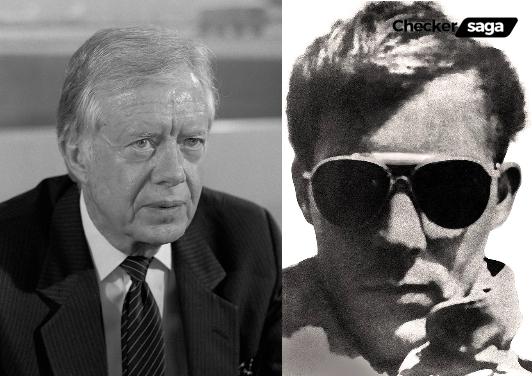In a remarkable encounter that shaped both history and political journalism, Hunter S. Thompson, the acclaimed writer known for his fearless style, crossed paths with then-Governor Jimmy Carter during Law Day at the University of Georgia in 1974. As the room vibrated with Carter’s passionate words, it became clear that this moment would resonate in the annals of American politics.
The Power of Words
Jimmy Carter took to the stage in May 1974, and his speech was anything but ordinary. He spoke against the injustices in the criminal justice system, advocating for civil rights and justice. It was a message that rivaled the musical excellence of Bob Dylan, whose songs had inspired a generation. With every word, Carter went beyond mere political rhetoric; he ignited hope among those present, including Thompson, who couldn’t help but be moved by the power of his speech.
A Connection to Music
As Carter spoke, he linked his sense of justice back to the poignant lyrics of Bob Dylan. This connection not only highlighted his understanding of societal issues but also showed how deeply intertwined music and politics were. For Thompson, who had long portrayed political events through a lens of cultural commentary, this approach added a layer of authenticity to Carter’s message, resonating deeply with his view of the world.
Thompson’s Influence on Journalism
Hunter S. Thompson is often considered the father of Gonzo journalism, a style that mixed facts with personal experiences and emotions. His book *Fear and Loathing on the Campaign Trail ’72*, published just a few years before their meeting, marked a significant turn in how political narratives were crafted in journalism. Thompson’s sharp wit and unique perspective put him at the forefront of political commentary during a time when America was searching for the truth amid chaos.
Facing Challenges Together
Both Thompson and Carter faced immense challenges in their respective fields. While Carter struggled with the energy crisis and the Iran hostage situation during his presidency, Thompson battled with personal demons and the changing landscape of journalism. Their meeting at Law Day represents not just a moment in time but a crossroad where sincerity in public service met raw honesty in journalism.
Remembering a Legacy
Fast forward to today, and the echoes of that Law Day still resonate. Hunter S. Thompson passed away in 2005, leaving behind a legacy of truth-telling in journalism, much like Jimmy Carter continues to inspire with his humanitarian efforts post-presidency. Carter’s journey has shown that integrity in leadership matters, while Thompson’s work exemplifies the importance of using one’s voice—whether through writing or speech—to induce change.
A Table of Influences
| Influence | Key Moments |
|---|---|
| Hunter S. Thompson | Wrote *Fear and Loathing on the Campaign Trail ’72* highlighting the political landscape. |
| Jimmy Carter | Spoke at Law Day ’74, advocating for civil rights and justice inspired by Bob Dylan. |
This table illustrates the pivotal roles both figures played in shaping their respective fields, emphasizing how their legacies remain interconnected.
A Lasting Impact
The significance of the meeting between Hunter S. Thompson and Jimmy Carter goes beyond their individual accomplishments; it serves as a reminder that words have power. Carter’s advocacy for social justice continues to inspire new generations, while Thompson’s uncompromising approach to journalism urges writers to seek truth fearlessly. As history unfolds, we remember these two icons not just as separate figures but as symbols of a transformative era in American politics and culture.
























